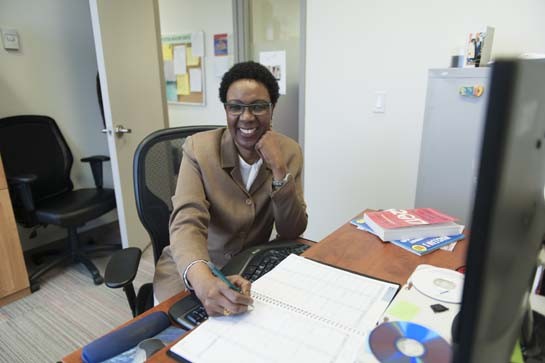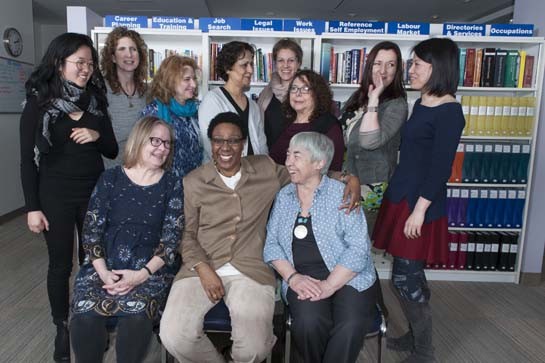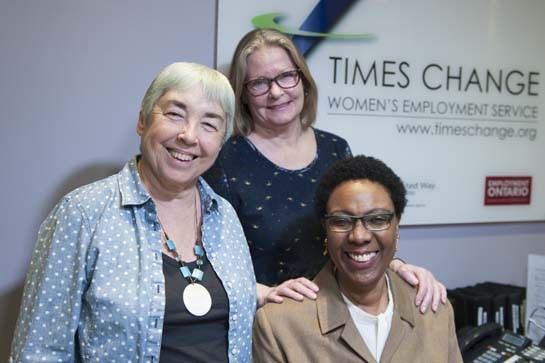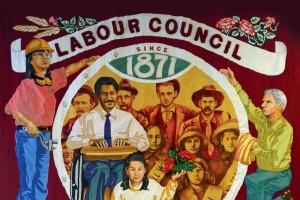"You're important, you will find work, and we can help you." That's what people who come in the door at Times Change are told, says Pat Bird (left), who worked there for 25 years.
Women find their way to the employment centre, one of Toronto's few remaining collectives, mostly through word of mouth. Ummu Shamte, who has been with the centre for 18 years, first came to Times Change as a client. "We've always had a strong reputation in the community with other women's groups and organizations, local MPPs and other politicians," she says. Times Change often participates in forums and marches led by women and labour unions, and is part of several umbrella organizations and advocacy groups.
Shamte says the centre also does regular outreach with libraries, doctors, therapists, and social service offices. "We keep our website updated, and we actively engage the community through social media."
A SAFE AND SUPPORTIVE ATMOSPHERE
Times Change welcomes anyone who self-identifies as a woman, and every year the service sees over 1,500 clients from diverse ethnic and socio-economic backgrounds. "We always strive for inclusivity," says Shamte. For example, "we educate ourselves about trans issues, which helps us to remain an open and welcoming community."

Cynthia Downey is an Employer Services Consultant with Times Change. PHOTOGRAPH: ROSE HA
Over half of the women who come through the doors of Times Change have been unemployed for more than a year, and workers there understand how isolating searching for a job can be. It's no surprise then that women who have used the employment service report feeling safe, supported, comfortable, and less stressed after doing so.
Starting in 1974 as a non-profit, charitable community agency, Times Change originally concentrated on employment counselling. Over the years, the service added a resource centre and began offering counselling around education as it related to women's employment and training goals.
One of Holly Kirkconnell's roles at the employment centre was as an employment counsellor. During her 32 years with Times Change, she often conducted employment-search sessions for clients. Now retired, Kirkconnell came back as a volunteer last year to talk to current staff and the board about the collective's history and how its structure works, "for the benefit of new board and staff members who may not have had experience working with collectives."
Walking distance from Sherbourne Subway Station in Toronto, the Times Change office is located in a 45-year-old retail complex known as Postmedia Place. The Bloor Street building is also home to the Association of Ontario Midwives as well as service organizations targeted to youth. Ironically, these and other progressive organizations co-exist with the conservative newspaper The National Post.
Take the elevator up to the 10th floor and you'll find a warm and welcoming space. Save for those on the offices of staff and volunteers, there are no doors to serve as potential obstacles while clients access different areas. The resource centre offers tables and seating space, as well as three computers for drop-in use.
MAKING CONNECTIONS
Created in 1983, the resource centre allows women to connect with each other in a comfortable space. Book shelves offer literature on how to find employment, on different types of jobs, and on labour laws. There is a larger room for events and workshops, and a computer room with nine more computers. Green plants line window ledges throughout the space.
Kirkconnell remembers the IBM Selectric typewriter clients used to practise typing on: "It was the best at the time," she laughs. Eventually the centre secured funding for computers, a computer room, a teacher, and a technician.
The staff has almost doubled, from six to 11 people, with the goal of creating a "one stop shop" of services for clients. The hiring of a "Second Career" counsellor, for example, means clients can apply for funding to go back to school through the Ontario government's Second Career program. With funding from Toronto's Investing in Neighbourhoods incentive, Times Change was also able to hire four support staff to help with the resource centre, and with administrative and marketing needs.
Obtaining funding has never been an easy process. "We always had to justify our existence," Bird explains. As a non-profit and a women's centre not only does Time Change face systemic obstacles, it must also be careful of how it conducts its advocacy. Shamte says the amount of advocacy a charitable organization can do is restricted. "According to Revenue Canada we're allowed to spend up to 10 per cent of our budget for advocacy."
The agency advocates for women's, labour, and human rights issues through organizations such as the Ontario Child Care Coalition, the Equal Pay Coalition and in cooperation with various labour unions.

Ummu Shamte Has Worked At The Centre For 18 Years. PHOTOGRAPH: ROSE HA
After being hired in 1980, Kirkconnell figured she would stay at Times Change for two, maybe three years. She remained until 2012. "No one really leaves Times Change," says Kirkconnell happily, adding that many workers volunteer after they leave. Indeed, strong and enduring relationships have developed among the staff. Workers have seen each other through personal life events such as break-ups, births, and deaths; and retired workers continue to meet regularly for lunch.
Because the organization operates as a collective, everyone has an equal voice, and everyone is paid the same. Kirkconnell attributes the low worker-turnover rate to workers feeling they have more buy-in and thus remaining loyal to an organization they feel they have control over. "When people have equal say and input, decisions tend to be better ones."
Both Kirkconnell and Bird believe that the small number of people working at Times Change is another important factor. They're unsure if a larger organization could operate as a collective.
EQUAL PAY, EQUAL SAY
As a collective, workers have to reach an agreement with each other on how things operate. "Collective decision-making doesn't mean we always agreed," says Bird. The process, the two women agree, can be uncomfortable at times, but issues are hashed out in an organized, respectful manner.
All decisions are made and recorded in weekly meetings, and everyone is given the opportunity to add items to the meeting's agenda. Only when an issue cannot be decided by consensus is a vote taken. Each member acts as chair and secretary on a rotational basis.
Working in other collectives prior to her years at Times Change, Bird saw how easily things can go sour, witnessing competitiveness and the harmful behaviour of those she calls "Queen Bees." Both Kirkconnell and Bird cite maturity as integral to why Times Change works as a collective: members listen to each other with respect and openness. All are able to compromise, and each one is willing to take on responsibility.
Kirkconnell was hired on to Times Change in 1980 partly because of her experience with unions. She worked at a variety of places in the early 1970s and began working for the federal government in 1975 where she became a member of the Public Service Alliance of Canada. She continued part-time university studies in subjects like political economy, women's studies, and Canadian studies while working. She was hired at Times Change at what she calls the perfect time, just as the women's movement that burgeoned in the mid-1970s was really beginning to experiment with different ways to share and hold power.
UNIONIZED STAFF
Women in the labour force made considerable progress during that decade as the public sector became unionized. Times Change workers also wanted to unionize. They were intent on ensuring that wage rates, benefits, and legal conditions were enshrined in their collective agreement. Kirkconnell says that the Ontario Public Service Employees Union was "doing great things with women" in the early '80s, and that's the union workers signed up with.
As president of OPSEU Local 512, Kirkconnell oversaw the first collective agreement in 1981 and remained a union steward for many years. Since the workers knew the ins and outs of their operation, they could educate successive union reps on how the collective functioned. "Because of this it doesn't take too long to negotiate an agreement," Kirkconnell says. The collective manages the day-to-day operations of Times Change, with a Board of Directors as the collective's employer.
"It was a good gig, really," says Bird, who needed enough hours to make a decent wage, but also needed to be able to care for her young daughter. The collective offered full-time work without a lot of overtime — a plus, Bird feels, for any working mother. "I would add that when my mother was in failing health, Times Change was also a supportive employer."
It was Bird who became the liaison between Times Change and the Equal Pay Coalition. "It was a case of 'We need somebody there. Can you do it?'"
EQUAL PAY COALITION
The coalition, led by women like Mary Cornish, was created in 1976. Bird became a rep in the 1980s on a voluntary basis. She describes the Equal Pay Coalition as a good group of action-oriented union women who always raised the question "What is the next step for us?" at their monthly meetings.
The coalition connected a broad range of women and ensured women's voices were the first to be heard in the fight for equal pay. "It wasn't a given we would get the legislation," says Bird, citing the attitude at the time that women in the workforce were "just" secretaries.
In 1986, a milestone was realized when the Ontario government came out with the "green paper," legislation on equal pay in the workforce. As Bird says, it took a lot of political pressure to have pay equity recognized, but the wage gap continues. More work always needs to be done, and so the coalition continues to fight to bring issues of equal pay to all levels of government.

“No one really leaves Times Change,” says retiree And volunteer Holly Kirkconnell (front, left). PHOTOGRAPH: ROSE HA
Bird offers a favourite personal success story involving a Times Change client she worked with. An Iranian immigrant named Jasmine came to Times Change with the hope of working as a teacher in Canada. A former teacher herself, Bird encouraged her to pursue that dream, in spite of Jasmine being told she should look for secretarial and clerical work in a country that did not recognize her teaching credentials from Iran. Bird helped with an application that enabled Jasmine to take a one-year course that would see her education recognized, and she has been working as a teacher ever since.
Other successes, says Kirkconnell, include a workbook Times Change created for women in 1993: Times Change: A Career Planning Workbook for Women, which has been updated numerous times through the years. It is the basis of the organization's career-planning workshops. Funded initially by the Ontario Women's Directorate, "it helps clients to learn about themselves in an organic way," says Kirkconnell. "Most tools go from outside in, these tools go from inside out."
The workbook looks at career planning and factors that affect it, such as changes in the workforce, societal barriers, and the numerous life responsibilities women often carry aside from work.
As the Toronto-area workforce moves from full-time employment to contract-based work and other precarious employment situations, the collective will need to adapt. To that end, staff are hard at work on a program called Career Connections. The project is a career-planning workshop designed specifically with precarious and contract-based workers in mind.
Securing a grant through the United Way of Toronto & York Region, the agency is expanding their services to include a free evening career planning and mentorship program for women living on low incomes, in hopes of lifting them and their families out of poverty.
That Times Change continues to exist as a service geared specifically to women is a success in itself. Shamte says the collective has always had to fight to keep Times Change alive as a safe space for women, and its members will continue to do so. And they will keep organizing advocacy campaigns and meeting with MPPs in the Greater Toronto Area to show just how strong the need is for a women's employment centre. She sees those actions as the reason why Times Change remains one of the few government-funded women-focused agencies.
Says Shamte: "Until women do not live in fear of abuse, and assault and harassment, and until women achieve equity and parity at all levels of corporate and government entities, a service like Times Change will be justified."
Mother of one sassy daughter and three black cats, Hillary Di Menna writes about social justice with an emphasis on feminism. She has been published in This Magazine, NOW Magazine, and The Establishment. Hillary also runs her personal mothering blog Misfit Matriarch.















